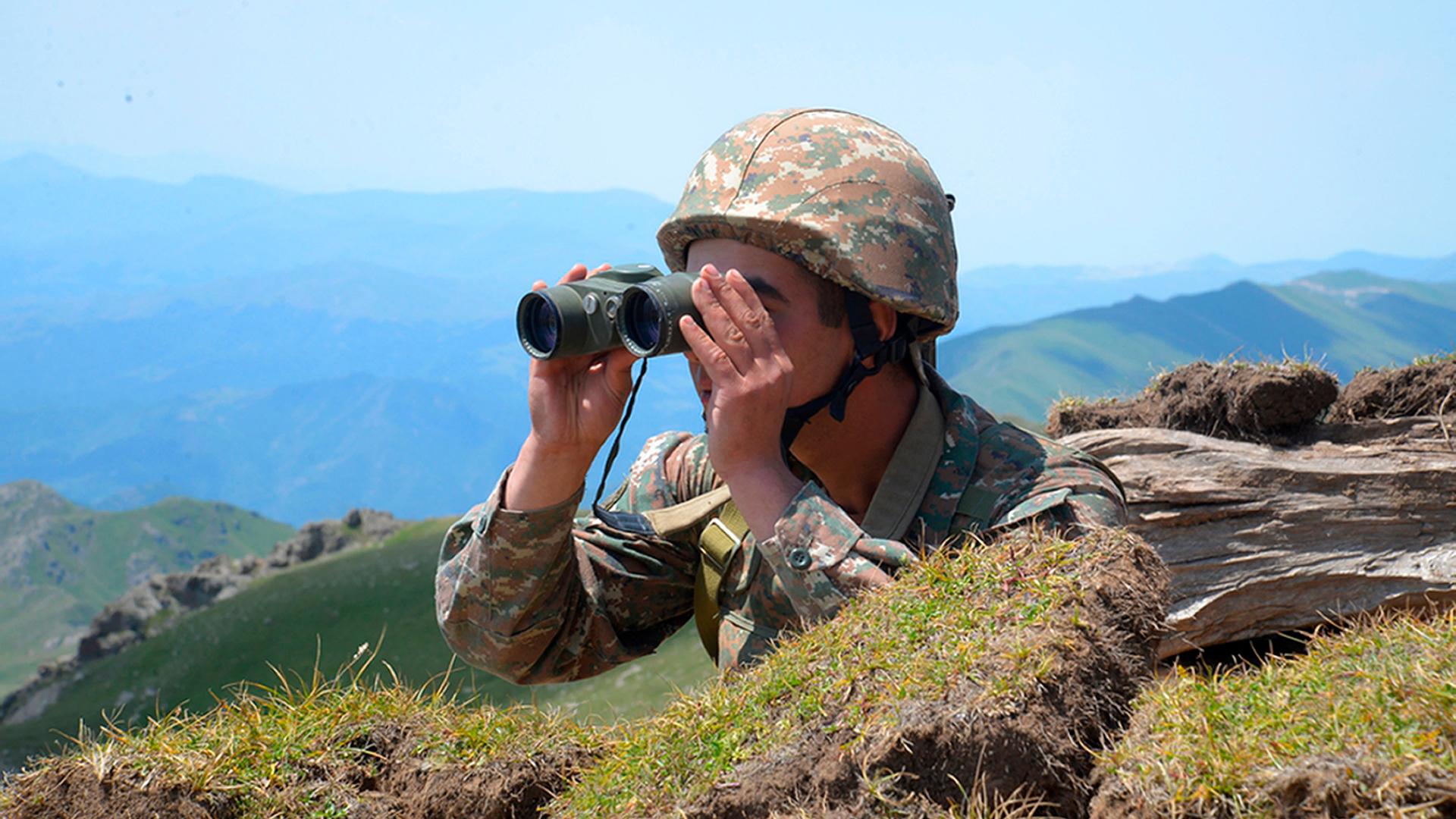The recent Azerbaijan-Armenia clashes point towards a broader geopolitical tussle in the region.
The latest border tensions between Armenia and Azerbaijan were bad news not just for the two countries, but for the entire South Caucasus.
The clashes at the Armenian-Azerbaijani border in mid-July resulted in the biggest losses since 2016. The events of July also became notable for being directed at the internationally recognised state borders of both countries, which are not a point of contention.
After Armenian forces violated a cease-fire and Azerbaijani casualties – including a major-general – mass protests against the occupation in Nagorno-Karabakh took place in Baku, Azerbaijan, and even in other countries.
Turkey was one of the first countries to respond to the clash and expressed its support for Azerbaijan on every level. The Turkish foreign and defence ministers released strong messages against Armenian attacks, and President Recep Tayyip Erdogan highlighted the possibility of a more powerful outside force orchestrating the clashes. These statements were followed by one of the largest joint military exercises in the region’s history where the Turkish army and air forces conducted joint drills with their Azerbaijani counterparts in July and August across several parts of Azerbaijan.
The role of energy has also brought Russia to the table in the region. The clashes took place in the Azerbaijani border district of Tovuz, which is not a source of contention, unlike the occupied Nagorno-Karabakh zone.
Tovuz is located close to the energy streamlines which pass through Georgia headed for Turkey. These pipelines are the lifeline of the Azerbaijani economy and are very important for Turkey’s energy supply. Both Azerbaijani and Turkish interests came under threat from the confrontation, which is likely the reasoning behind President Erdogan’s insinuation that a third party could have instigated the Armenian attacks.
Russia also has certain considerations. Moscow would not want to see Azerbaijan adopt an aggressive anti-Russian stance. For the Kremlin, the emergence of another Georgia is out of the question. While Baku has tried to maintain a balance in its foreign relations, keeping the same distance vis-a-vis Moscow and Washington, Russian decision-makers are not entirely satisfied.
Baku refrained from joining the Russia-led the Collective Security Treaty Organisation (CSTO) and the Eurasian Economic Union but it did also distance itself from Western organisations like NATO and the European Union. Baku has not adopted anti-Russian rhetoric the way Georgia did back in 2008.
Russia has also abstained from adopting an aggressive stance toward Azerbaijan – but other factors were also at play. CSTO members did not support their fellow ‘ally’ Armenia against Azerbaijan. CSTO members, Kyrgyzstan and Kazakhstan, share ethnic and religious ties with both Azerbaijan and Turkey and cooperate as members of the Turkic Council. Furthermore, Belarus has a ‘special relationship’ with Azerbaijan based on defence contracts and trade deals.
On the other hand, Russia is trying to keep Armenia on a tight leash. Despite rising anti-CSTO sentiment in Yerevan, Armenians understand that there is no other choice. Russian military assistance is highly beneficial. The country obtains weapons at a discounted price, and Moscow’s protection gives Armenia some degree of deterrence against other forces. Moscow constantly repeats the importance of the Russian military base in Armenia, which is an outpost for Russian interests in the region.
While Russia armed both sides of the conflict, experts argue that the military and political rapprochement between Turkey and Azerbaijan can further push Armenia toward Russia.
Moscow sold almost $5 billion worth of arms to Azerbaijan while supplying Armenia with its other hand. Deliveries of the first SU-30SM squadron and other forms of support has enhanced Armenia’s defence capabilities considerably.
After the Tovuz clashes, the Kremlin raised the alert status for its Western and Southern Military Districts. Russian forces also conducted joint drills with Armenia on air defence and common strategy development on warfare against UAVs. This tit-for-tat move followed Turkey’s decision to provide UAVs to Baku and the joint air defence drills that took place.
The Russians likely did not expect such resolute support for Azerbaijan. Turkey’s decisive move to send troops with air support to Azerbaijan showed once again that Baku does not stand alone.
After Turkish-Russian tensions in Syria and Libya, the South Caucasus seem to be emerging as another flashpoint for both sides. Ankara’s rapprochement with its Western allies seems to annoy Moscow.
The shift in Turkey’s energy supply by enhancing domestic capabilities, increasing supplies from Azerbaijan, Qatar and the US, while decreasing dependency on Russia, also irritates Moscow. Experts claim that Russia replied to these developments in Tovuz, placing Azerbaijan as a target to provoke Turkey.
Even so, Baku does not want to inflame the situation with Russia. This stance is exemplified in the recent visit of Russian Defence Minister Sergei Shoigu to the Azerbaijani capital. The Russian minister denied his country was sending arms to Armenia during clashes and claimed that cargo planes were sent to rebuild the Russian military base in Armenia.
Regardless of the veracity of these claims, it is clear that Baku cannot rely on its northern neighbour. On the other hand, Turkey has proven to be Azerbaijan’s friend in times of need and has gone the extra mile to restore balance.
Author: Turan Gafarli
Turan Gafarli is an Assistant Researcher at TRT World Research Centre. He holds a Bachelor of Arts in History and Politics from Queen Mary University of London and a Master of Arts in Transnational Studies from University College London.
Source










Discussion about this post